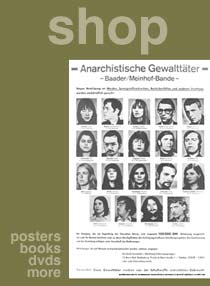pre-1968 > 1968 > 1969 > 1970 > 1971 > 1972 > 1973 > 1974 > 1975 > 1976 > 1977 > post-1977
.jpg) |
2 April 1968, Frankfurt am Main - Andreas Baader and Gudrun Ensslin, along with two comrades, eave bombs in the Schneider department store, causing $75,000 worth of damage.
|
1968
22 March, Berlin
Fritz Teufel and Rainer Langhans are found Not Guilty of Incitement to Arson, for passing out the leaflets the previous spring. According to Baader-Meinhof biographer Jillian Becker, the expert witnesses agree, "the pamphlets were literary compositions, not to be acted on but for theoretical considerations only." Theoretical to everyone, it seems, except Andreas Baader and his new girlfriend Gudrun Ensslin.
2 April, Frankfurt am Main
Baader and Ensslin head to Frankfurt am Main with two friends, Horst Söhnlein and Thorwald Proll. Baader has acquired quite a reputation as a "dangerous" sort by his constant calls for violent action. Invariably no one would choose to act on his "suggestions." Today is different. This time Baader's fellow comrades elect to take Baader up on his suggestion to burn down a department store.
Later that night Baader and Ensslin leave two time bombs in the Kaufhaus Schneider department store. Söhnlein and Proll leave a bomb in the Kaufhof store. At midnight the bombs go off, ultimately causing about $200,000 worth of damage. While tthe first flames appear, Ensslin is on a pay phone, screaming at the German Press Agency, "This is a political act of revenge!"
4 April, Frankfurt
Unable to keep their deeds a secret, police arrest Baader and his comrades for the arsons.
11 April, Berlin
A young house painter, Joseph Bachmann, waits patiently in the street outside the home of Rudi Dutschke. Dutschke is the firebrand leader of the APO -- a leftist movement. In Bachmann's coat pocket is a gun. Bachmann shoots Dutschke three times, knocking him clean out of his shoes. Dutschke survives his shooting. Immediately following the shooting Bachmann hides out in a basement of a local building, and swallows 20 sleeping tablets in an effort to commit suicide. The effort fails.
Enraged students assume that the reason Dutschke was targeted is because of the red-baiting rhetoric of the newspapers of the Springer Press newspapers. Owned by the rabidly anti-communist Lord Axel Springer, the Springer Press papers dominate Germany, constantly spewing anti-left diatribes, particularly against "red" Rudi Dutschke.
.jpg) |
11 April 1968, Berlin. Thousands of students converge on the Berlin headquarters of the Springer Press, whose incendiary coverage of Rudi Dutschke led many to conclude that Springer Press newspapers were responsible for the attempted assasination of Rudi Dutschke earlier that day. |
Thousands of students converge on the 20-story Springer Press headquarters that straddles the Berlin Wall. Ulrike Meinhof is there, having driven there with her konkret editor (and future Baader-Meinhof biographer) Stefan Aust. Many students have parked their cars in front of the building, forming a blockade. Aust suggests that Meinhof park her car in the blockade, but she isn't so sure she wants to get involved to such an extent. They compromise by parking her car at the very end of the blockade, but Meinhof is arrested anyway. Later she avoids conviction by persuading the court that she is only guilty of a fantastically poor parking job. Tentative as it is, Meinhof's poor parking job is her first direct action against the capitalist system. It would not be her last.
13 October, Frankfurt
Baader, Ensslin, Söhnlein, and Proll are convicted of Arson. They each get three years.


